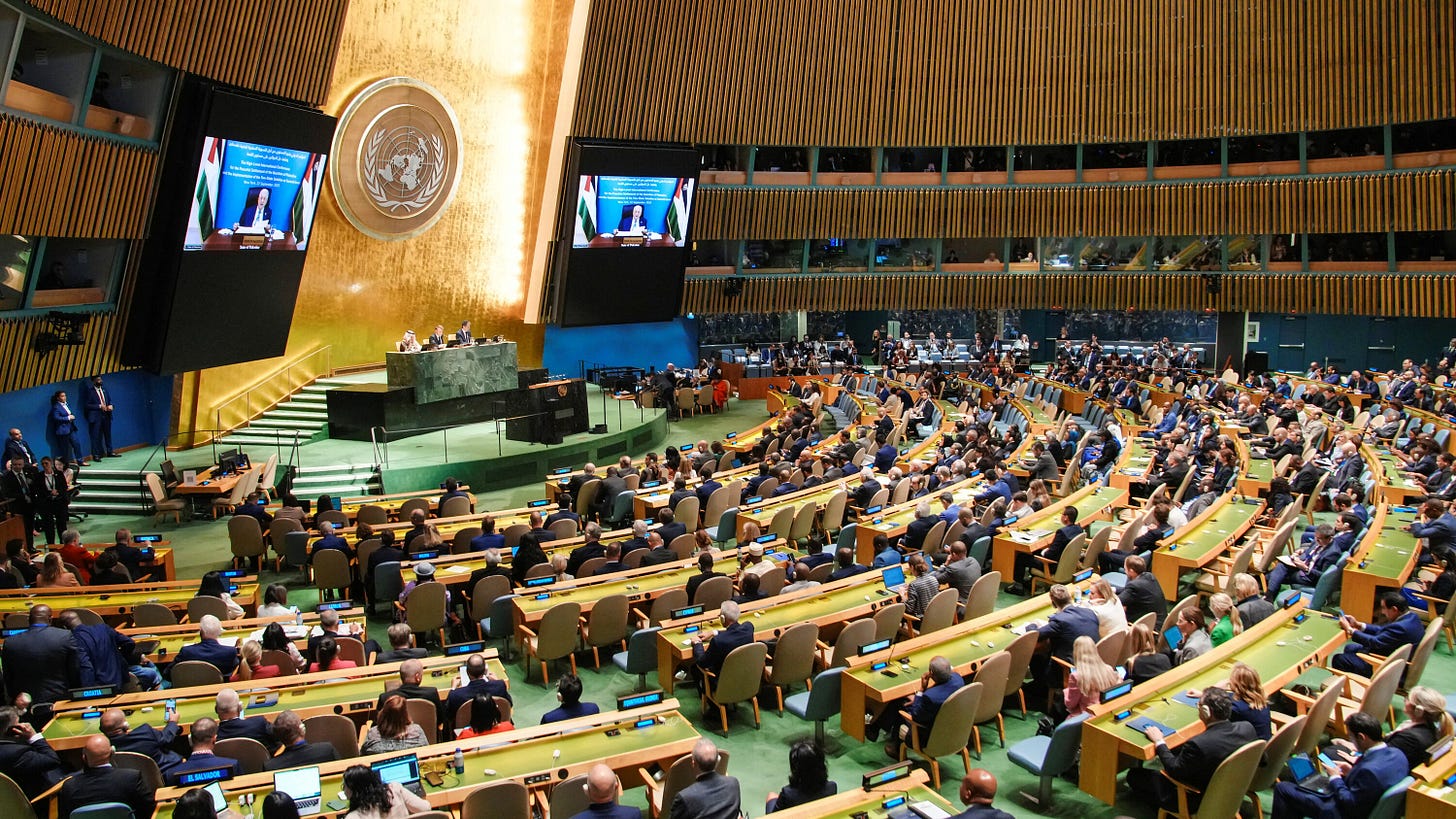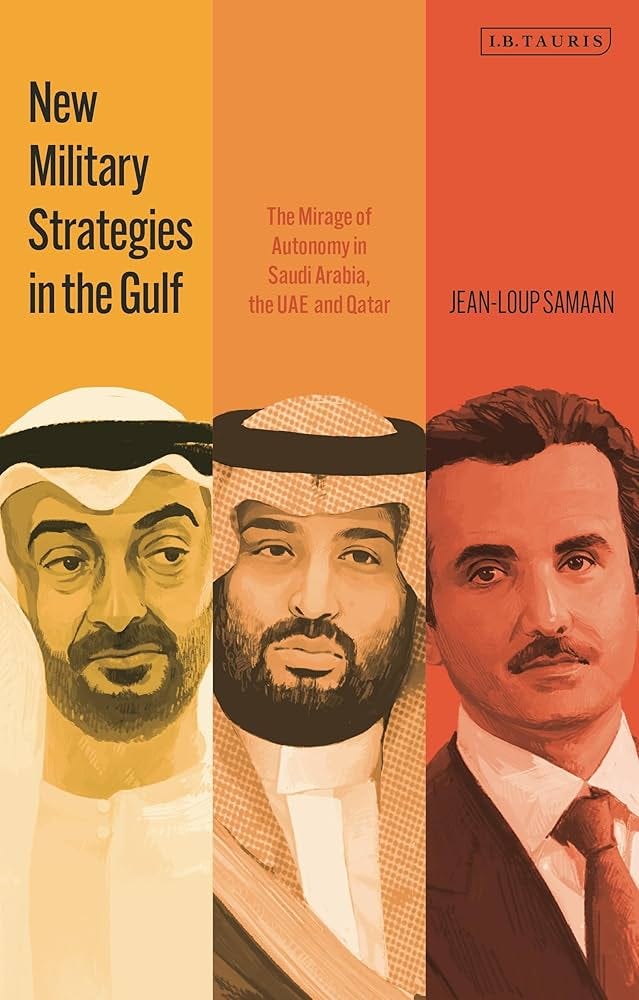The Gulf Nashra Weekly Digest
Saudi Co-Leads Palestine Recognition at UNGA, Sudan Talks, Syria Funding, and Kuwait Legal Reforms
Media Coverage
Geopolitics
“Trump’s meeting with Saudi, Qatar, UAE focuses on reaching permanent ceasefire in Gaza.” Alarabiya, September 25, 2025.
“The meeting was held on the sidelines of the United Nations General Assembly in New York and included leaders from the United Arab Emirates, Qatar, Saudi Arabia, Egypt, Jordan, Turkey, Indonesia and Pakistan, WAM added.”
Go Deeper: “Insights from Israel and the Gulf: An evolving regional integration.” Atlantic Council, September 18, 2025.
“Saudi-led global Palestine peace effort rallies support at UN.” Arab News, September 25, 2025.
“The Kingdom will continue its diplomatic and humanitarian work in order to help return the Palestinian borders based on 1967 lines, and to have security and prosperity for the whole nations of the area.”
Go Deeper: “Recognition of Palestine can be more than symbolic if Europe and Gulf states remain aligned.” Chatham House, September 25, 2025.
“Saudi FM Joins US, Egypt, UAE in Talks on Sudan at UN Gathering.” The Media Line, September 25, 2025.
“The participants discussed ways to confront Sudan’s worsening crisis, with particular focus on humanitarian needs. They emphasized the importance of unified international efforts to alleviate suffering and deliver aid to affected civilians. “
Go Deeper: “The falcons and the secretary bird: Arab Gulf states in Sudan’s war.” European Council on Foreign Relation, July 30, 2025.
“Qatar Fund for Development and the Saudi Fund for Development Launch Joint Initiative to Sustain Public Services in Syria in partnership with UNDP.” UNDP, September 24, 2025.
“These recovery efforts are designed to contribute to resilient governance, inclusive economic growth, and sustainable development throughout the Syrian Arab Republic.”
Go Deeper: “The Saudi-Qatari Competition for Influence in Syria.” Foundation for Defense of Democracies, September 16, 2025.
“UAE FM to warn Israel’s Netanyahu against annexation in New York meeting: Official.” Alarabiya, September 27, 2025.
“Sheikh Abdullah bin Zayed is set to meet Netanyahu in New York on the sidelines of the UN General Assembly. Earlier in the day, Netanyahu slammed countries that recognized the State of Palestine this week and attempted to slam the door shut on any efforts for a two-state solution or put an end to the war in Gaza.”
Go Deeper: “When the UAE Says “No” to Israeli Annexation, What Does It Mean?” Washington Institute, September 9, 2025.
Market & Economy
“PIF, Aramco, BlackRock heads unveiled in FII9 speaker lineup.” Arab News, September 24, 2025.
“Scheduled for Oct. 27-30 at the King Abdulaziz International Conference Center, the Kingdom’s flagship investment summit will bring together more than 600 speakers across 230 sessions, including heads of state, investors, and industry executives..”
Go Deeper: “How Saudi Arabia Outpaced the Region In Q1.” Magnitt, April 2025.
“Nvidia, Abu Dhabi institute launch joint AI and research lab in the UAE.” Alarabiya, September 25, 2025.
“The joint research hub is the first Nvidia AI Technology Center in the Middle East, TII said in a statement, combining its multidisciplinary research with the US company’s AI models and computing power, which are fueling a global artificial intelligence boom.”
Go Deeper: “The United Arab Emirates’ AI Ambitions.” Carnegie, January 24, 2025.
Domestic Issues
“Kuwait aims to update 250 laws by 2026.” Alarabiya, September 23, 2025.
“Minister of Justice Counselor Nasser Youssef Al-Sumait explained, during a presentation before the council, that the number of laws currently in force stands at 983. A total of 181 laws (18%) have been reviewed over the past nine months. He noted that the plan is based on three main pillars: social, economic, and criminal, with clear performance indicators and defined timelines.”
Go Deeper: “Kuwait’s Bureaucracy at a Crossroads: Why Government Innovation Stalls and How Analytics Can Reignite Reform.” Carnegie, August 29, 2025.
“Oman’s total exports record 13.5 billion riyals, with a significant surge of 11.3% in non-oil products and goods.” Oman, September 26, 2025.
“Exports of base metals and articles thereof increased by 2.9% to reach 789 million Omani riyals. Exports of plastics and rubber products rose by 2.5% to 569 million riyals. Exports of chemical industries and related products grew by 10.7% to 497 million riyals. Exports of machinery, mechanical appliances, electrical equipment, and parts thereof jumped by 82.7% to reach 356 million riyals. Other exports recorded a growth of 23.7%, bringing their value to 643 million riyals.”
Go Deeper: “Monthly Statistical Bulletin : September 2025.” National Center for Statistics and Information, September 21, 2025.
Saudi Arabia: “Oldest human settlement in Arabian Peninsula discovered near Tabuk.” Arab News, September 26, 2025.
“The oldest architectural settlement in the Arabian Peninsula, dating back to the pre-pottery Neolithic period of 10,300-11,000 years ago, has been discovered near Tabuk, Saudi Arabia’s Ministry of Culture announced on Thursday.”
Go Deeper: “11,000-Year-Old Settlement Unearthed: Saudi Arabia Reveals Oldest Human Settlement in Arabian Peninsula.” Arkeonews, September 27, 2025.
Gulf Opinions
Amid the recent sessions of the United Nations General Assembly in New York, Gulf commentators concentrated on the recognition of the State of Palestine and the renewed advocacy of a two-state solution as a pathway to peace. From Saudi Arabia, Abdulaziz Al Jarallah proudly emphasized that just as Britain pledged in 1917 the establishment of Israel, Saudi Arabia and France in 2025 pledged the establishment and recognition of a Palestinian state. His compatriot, Abdulrahman Al Trairi, argued that the Assembly’s debates are accelerating global recognition of Palestine, driven largely by international backlash against Israel’s actions in Gaza. While acknowledging that Israel’s domestic coalition may remain resilient, Al Trairi cautioned that mounting diplomatic pressure—particularly from Europe and the United States—combined with shifting global public opinion, could impose significant political and economic costs on Israel. Similarly, from Qatar, Muhanna Jaber Al Naimi underscored a decisive shift in the regional balance of power. Unlike Israel, he argued, Saudi Arabia and Qatar have asserted influence not through force but through diplomacy, uniting Arab ranks and mobilizing an international voice against Israel from the heart of the United Nations. This, he maintained, represents an unprecedented development in Arab politics. Al Naimi further contended that Saudi-led Gulf diplomacy, supported by Qatar and other Gulf states, has effectively repositioned both the Palestinian cause and the Syrian file on the international agenda, transforming high-level summits into genuine diplomatic momentum.
By contrast, Dr. Saeed Al Kathiri of Oman attributed the UN developments directly to events in Gaza, insisting that “the resistance welcomed this recognition as a step towards strengthening the legitimate rights of the Palestinian people to freedom and self-determination,” framing it as a clear “victory for the resistance.” From Kuwait, Abdul Hamid Al Shaiji adopted a more conspiratorial view, arguing that Israel cannot be restrained by international campaigns because it remains a “colonial project” implanted in the region to act as the “region’s policeman,” and has for over a century perpetuated “dispossession, occupation, and violence.” In contrast, Oman’s Salem Al Jahwari expressed cautious optimism, asserting that recognition of Palestine by the United Kingdom, Canada, and Australia constitutes “a historic turning point.” He added that the wave of global protests in the United States and Europe “signals a new international alignment in favor of the Palestinian cause as more influential states move to recognize it after the collapse of Israel’s false narrative.” Finally, former Emirati ambassador Ahmed Al Hosani adopted a more measured position, criticizing Israel and holding it accountable both for the UN Security Council’s efforts to recognize Palestine and for the surge of global solidarity with Palestinians. He specifically blamed Prime Minister Netanyahu, warning that Israel’s reliance on force—epitomized by the reckless assault on Qatar as a key mediator—exposed strategic mismanagement, jeopardized the Abraham Accords framework, and accelerated Israel’s isolation regionally and internationally.
Other Gulf Opinions
“I wish he [Tom Barrack, US Ambassador to Turkey] would avoid interviews or media statements, as his comments consistently display profound ignorance and a reductive orientalist perspective, mirroring the zeal and naivety of a fervent American football fan.”
Hesham Alghannam, X, (Saudi Arabia), Sep 26, 2025.
“#Tom_Barrack learned a couple of words about the region’s history and thought himself a historian lecturing Arabs! He reminds us of some American journalists after #September11: they went to sleep in ignorance and woke up overnight as “experts” on Islam and Islamic movements.”
Dawood Alshirian, X, (Saudi Arabia), Sep 26, 2025.
“Israel is not deterred by statements, but by balances of power.”
“The most notable step came from Riyadh on September 17, with the signing of a mutual defense agreement with Pakistan. The agreement stipulated that any attack on one party would be considered an attack on the other, thereby transforming the phrase ‘joint security’ from rhetorical language into a contractual commitment. This marks a qualitative shift, as it links the Gulf to a partnership with a nuclear state and lays the foundation for a strategically significant alliance.”
Mohamed Aljadei, Al Qabas, (Kuwait), September 24, 2025.
“What is the use of these Arab summits in an era when political paralysis and Arab abandonment have become so evident? The summits are incapable of taking any real action against the aggression targeting Arab states under Israeli fire: Palestine is slaughtered daily, Syria is mercilessly destroyed, Lebanon sinks into political and economic collapse, Yemen endures the ugliest forms of war and famine, and Qatar is besieged by regional schemes and pressures. What have these summits achieved? What concrete stance or measure have they taken? Nothing. All they have produced are hollow words, ceremonial decrees, and statements shelved away, while the grim reality on the ground grows more tragic by the day.”
Mohammed bin Ali Albadi, Al Roya, (Oman), September 24, 2025.
“What is before Lebanon today is not merely a choice between surrendering weapons or keeping them, but between sliding into a new war directed by Iranian and Israeli decisions over the heads of the Lebanese people, and making a last attempt to restore the very concept of the state. No one denies that the Lebanese state is weak and constrained, but continued hesitation will render it entirely absent, turning the country into an open battlefield.”
Abdulah Alhashmi, Al Etihad, (UAE), September 20, 2025.
Picks
Book: Samaan, Jean-Loup, “New Military Strategies in the Gulf: The Mirage of Autonomy in Saudi Arabia, the UAE and Qatar.” Bloomsbury, August 10, 2023.
Analysis: “The lingering wealth gap in Saudi Arabia.” Andrew England and Ahmed Al Omran, Financial Times, September 24, 2025
Analysis: “Saudi Fiscal Policy Amid Global Oil Market Uncertainty.” Tim Callen, Arab Gulf States Institute in Washington, September 4, 2025.
Analysis: “Reinvigorating Japan-GCC State Ties: The Case for Enhancing Top-Level Diplomacy.” Kazuto Matsuda, Middle East Council on Global Affairs, September 4, 2025.
Analysis: “Anchoring the Future: How China and Saudi Arabia Are Reshaping Their Partnership.” Yuan Zhang, Gulf Research Center, September 3, 2025.
Analysis: “Which investment firms actually get it right in the Saudi Stock market? Introducing MeshRanks.” Meshal Alkhowaiter, Saudi Labour Pulse, August 31, 2025.
Analysis: “Emirati-Saudi rivalry will stretch far beyond Yemen.” Oxford Analytica, August 29, 2025.
Analysis: “Kuwait’s Naval Modernization Push.” Leonardo Mazzucco, Arab Gulf States Institute in Washington, August 27, 2025.
Analysis: “Saudi Arabia’s financial hub finally takes shape.” Ahmed Al Omran, Financial Times, Aug 27, 2025.
Analysis: “The International North-South Transport Corridor.” Emil Avdaliani, Gulf Research Center, August 26, 2025.
Research: “Exploring the limitations of the UAE’s hard power.” Huzeyfe Altiok and Ali Bakir, Defense & Security Analysis, September 4, 2025.
Research: “The Evolution of Bahrain’s Tax Policy 2009–2024.” Omar Al-Ubaydli, Mariam Albinfalah, and Hasan Al-Sayegh, Economy of the Middle East, September 2025. [PDF].
Research: “Does royal family ownership influence the relationship between royal directors and real earnings management? Evidence from the Saudi Arabia.” Abdulaziz Alsultan, Cogent Business & Management, June 14, 2025.
Podcast: Saudi Arabia: “Are Private Schools Worth Their Fees?” Jadi Podcast, August 30, 2025. [English Subtitle].
Podcast: “A Middle East NATO? Regional Security Options After Doha.” Jason Campbell hosts Alistair Taylor and Matthew Czekaj, Middle East Institute, September 25, 2025.



